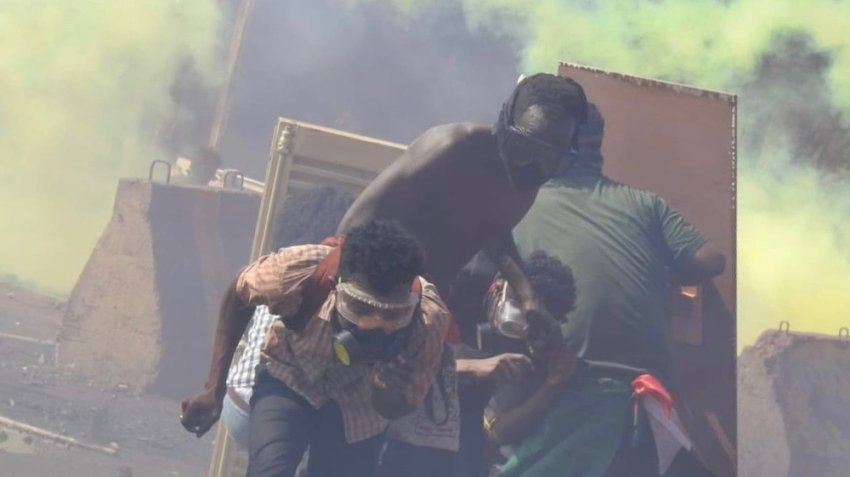
Thousands of elders took part in the Mothers and Fathers March in Sudan, on February 26, to voice their support for the youth who, organised under the neighbourhood Resistance Committees (RCs), continue resisting the military junta daily on the streets. The security forces attacked this demonstration, injuring at least 34 people, said the Central Committee of Sudanese Doctors (CCSD).
At least 83 pro-democracy protesters have been killed by security forces, and more than 3000 have been injured in the four months since the coup by army chief Abdel Fattah al Burhan on October 25, 2021.
More than 450 injured protesters remain hospitalised as of February 27, according to data compiled by Hadhreen Organization. Twenty-six have lost limbs or other organs and seven are paralysed.
Chanting “our children aren’t alone, we stand with them,” the elders marched on El-Siteen (Sixty) Street in the capital Khartoum, waving flags and holding up pictures of the martyrs.
The military junta attempts to portray the protesters as “street kids” and describes them as drug addicts, immoral, or anarchists. “The lies end here,” tweeted Nada Ali, with the picture of a placard that read: “Let the world witness that the ‘street kids’ have families who stand with them.”
Along with family members of martyred protesters, several political leaders, including Neimat Malik and Mukhtar al-Khatib of the Sudanese Communist Party (SCP), many of whose members are actively working in the RCs, also took part in the march.
Women’s rights activist and SCP member, Amira Osman, who was only recently released from prison, was also seen in the march. She had been held incommunicado for two weeks by security forces, who abducted her from her home at gunpoint.
Twenty people injured on the day were hit by stun grenades and tear gas canisters fired directly at their bodies. Five more injuries, including a skull fracture, were caused by “severe beatings with batons”, according to the CCSD. Another person was “run over by a vehicle belonging to the regular forces”. Instances of security forces using vehicles as weapons against the protesters are increasing and have been well documented in several video clips showing trucks used by security forces chasing fleeing protesters and deliberately mowing them down.
Participating in the ongoing protests under dangerous conditions are children, who are not spared by the security forces. Amir Khalid, a child who was run over by a military vehicle during the 20th nationwide March of Millions protest on February 21, is in a coma. At least 158 others were injured that day when mass-protests rocked 14 cities.
Maya Hasan Ahmed, a 14-year-old student, who was arrested with other minors from Omdurman that day, was finally released on February 25. Lawyers argue it is a case of “enforced disappearance”, because the security forces provided no information as to where she was detained. None of the police stations had registered her detention, nor have any charges been filed against her, Radio Dabanga reported.
More than 200 children are said to have been detained since the coup and subjected to violence.
United Nations Expert on Human Rights in Sudan, Adama Dieng, who concluded his visit to the country on February 24, told a media conference of “frightening reports” from women released from custody.
Risking a similar fate, the “mothers of revolution”, as they have come to be known, marched on February 26 in cities in states including Gezira, River Nile and North Kordofan.
Meanwhile, the Coordination of the Resistance Committees in Khartoum state unveiled its Charter for the Establishment of the People’s Authority, on February 27, which was prepared after months of deliberation. Last month, a proposal was made by Resistance Committees in Madani, the capital of Gezira state.
Consultations to deliberate on the charter are expected to finally lead to a common political vision uniting more than 5200 RCs, which have all declared that there will be “No negotiation, no compromise and no partnership with the military”.
Ruling out a return to the pre-coup arrangement, where the military and civilian leaders jointly led the government, the RCs have unanimously declared that they will accept nothing short of full civilian rule, to which the military is subjugated, and under whose authority the generals responsible for the coup are to be tried.
The charter calls for “a complete review of the Juba Peace Agreement” to remedy the fact that most of the stakeholders — including the internally displaced persons and the local civil and political forces representing the residents of the war-torn areas — were left out of the negotiations.
One of the most important non-negotiable objectives set in this charter is the reform of the state security sector, by dissolving the various militias and forming a single national army, answerable to a civilian prime minister through the minister of defense.
Withdrawal of Sudanese troops from Yemen, which had been among the original demands of the December Revolution since 2018, is once again reiterated.
The charter also calls for freeing much of the economy from the ownership of the army, which currently extends even to sectors unrelated to defense, including agriculture.
In what is arguably the most radical of all proposals, potentially unsettling not only the Sudanese military but also global finance capital, the charter calls for a review of “all financial agreements, including investment legislation and regulations, from June 30 1989”. This is the date when dictator Omar al Bashir seized power in a military coup and aggressively intensified neoliberal reforms of the economy over subsequent decades.
While the unity among the resistance forces has been consolidating over the months since the coup, divisions and fissures appear to be widening within the army. There have been reports that coup leader Abdel Fattah Al Burhan fears he might be replaced by a mutiny and dismissed hundreds of mid-ranking officers on February 14.
[Compiled from People’s Dispatch.]